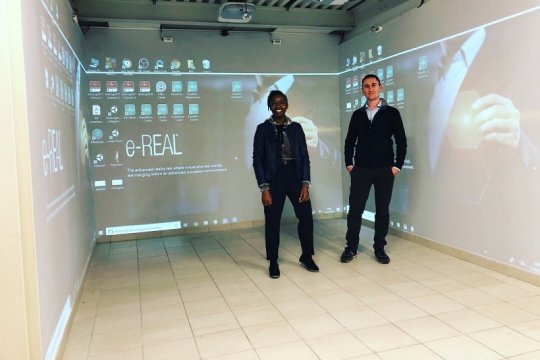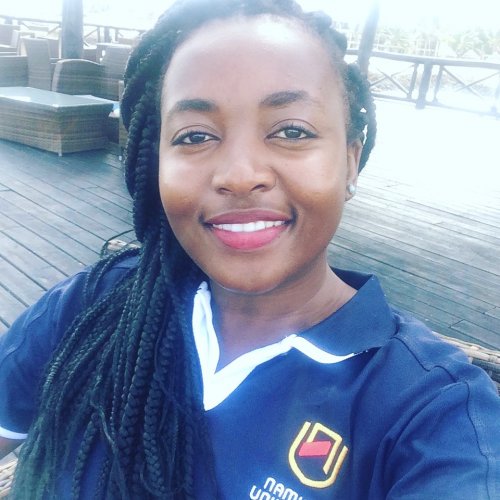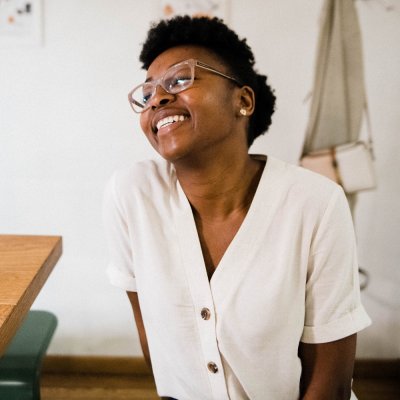“Always Be Resilient, Challenges Are Part of Life”
Asteria Ambata is an aspiring Cognitive Neuroscientist, currently employed as a Human Resources Business Partner at the Namibia University of Science and Technology. She is a Postgraduate candidate in Applied Experimental Psychology/Cognitive Neuroscience at the University of Milano-Bicocca in Milan, Italy. Creating synergy between Human Resources Practices and Neuroscience is what she hopes to accomplish.
Q: Tell us a few things about your country, and also your life's story!
A: I am natively from Windhoek, Namibia, a country that is situated in the South-Western side of Africa. The country is home to diverse wildlife, including a significant cheetah population. The capital, Windhoek, and coastal town Swakopmund contain German colonial-era buildings such as Windhoek's Christuskirche, built in 1907.
In the north, Etosha National Park’s salt pan draws game including rhinos and giraffes. The country’s name comes from the Namib Desert, which is considered to be the oldest desert in the world. Prior to independence in 1990, the colony was known as German South-West Africa and South-West Africa. Another interesting thing, relating to my country is that we have the second lowest population density in the world.
While growing up in a conservative and traditional household, has taught me to aspire towards excellence. Every decision that I had made was and is a reflection of seeking after excellence. This mindset opened up various avenues of opportunities that contributed to shaping my career and personal life. I have briefly highlighted a few accomplishments below:
- In 2012, at the age of 22, I founded a research company in Windhoek, Namibia named Kimberlite Consultants, the main services that I was interested in was/is research, although, at the time of establishing the company, I still had a lot to learn about what it meant to run a business. I had several hard lessons and major wins, which all contributed to developing my character. 7 years later, the same company was rebranded to AMB Collective (www.ambcoll.com) with a broader spectrum of business offerings and various brands under its management;
- After 3 years of being a full-time entrepreneur and graduating in April 2015, I joined a month later my Alumni University (Namibia University of Science and Technology) in the capacity of a Human Resources Business Partner, a position I held since June 2015 – September 2017;
- In November 2016, I was awarded a month-long scholarship from the Intra-ACP EU funded Project, to travel to East Africa (Dar Es Salaam, Tanzania) to take up a staff exchange mobility to continue learning about how other universities conducted their human resources practices. My staff exchange placement was at the University of Ardhi, in Dar Es Salaam; and then,
- In September 2017, I relocated to Italy, to further my studies (MSc in Applied Experimental Psychological Sciences) – and during that time, I had various opportunities to attend networking activities and to assist some research schools in Milan, in constructing and the development of several research surveys, projects that allowed me to hone analysis of data reporting.
Q: What is your view of the world as it is today? And how do you define the concept of a better world?
A: I believe there is an abundant ecosystem to create sustainable development, especially considering the state of affairs relating to climate change. A better world, in my view, would comprise of individual efforts to relinquish carbon footprint. Continuing to being a good human being, committing ourselves to live in such a way that the future generation would have a planet to also consider home. For example, Namibia is amongst countries most vulnerable to climate change, as it is one of the driest countries south of the Sahara. Moreover, it is highly dependent on climate change-sensitive sectors such as agriculture, livestock management and fishing. Hence, climate change impact could be catastrophic to Namibians, especially in lower income groups.
Q: As a young individual what are a few of the hurdles that you had to overcome up until today?
A: Definitely believing that one is able to actively play a part in creating the life you want and to have the tenacity to go after everything you desire as though it is already guaranteed. I think also shedding new light on the imposter syndrome, we so often speak ourselves out of opportunities simply because we do not believe we are worthy of receiving all good things. That is a hurdle I had to overcome.
Q: Why is the role of a mentor important for you?
A: Primarily for reasons relating to learning from someone who has gone through the same challenges as a young professional, and to be able to have insight in my mentor’s experiences and to take the necessary lessons in how they overcome my own challenges.
Q: Do you have a lesson that life has taught you and you would like to share?
A: To always be resilient, challenges are part of life, they determine what you are able to endure and eventually overcome. That is where your strength is developed.
Q: Name a project, a foundation or a person in your country that you think is doing great work in helping improve other people's lives!
A: I can name quite a few, but I think the one that certainly tops my list would be an organization called Worldview Technology, Co-Founded by Mr Kaveto Tjatjara and was a recipient of the Mandela Washington Fellow 2018 Cohort. Worldview Technology is a sanitation company that manufactures an innovative waterless toilet called the NEST (Namibia Eco-Sustainable Toilets). The NEST is an odourless toilet that disposes of human waste in a 100% eco-friendly manner that uses no water to produce compost. The situation for sanitation in Namibia remains of considerable concern. Lack of improved sanitation facilities, poor knowledge and low practice of basic hygiene or proper environmental sanitation behaviours combined with the health challenges associated with a high prevalence of HIV are manifested in increasingly high levels of diarrhoea-related mortality and morbidity. The company is on a quest to create a world where everyone has access to adequate sanitation by building an innovative waterless toilet. I find such efforts commendable and I believe such creative approaches to solving our national problems is what the country needs.

Q: What are some of the challenges that women in your country face and what efforts are made towards gender equality?
A: Namibia has paid special attention to women's empowerment and gender equality, which forms an integral part of its Constitution.
Q: Athena40 is the first ever global selection of the top 40 women forward thinkers, commentators, activists, authors, academics, entrepreneurs, executives, innovators. Can you think of a truly innovative and forward-thinking woman from your country that you wish to nominate for the Athena40 global list?
A: Dr Anna Matros-Goreses (Director of Project Services Unit at the Namibia University of Science and Technology) and Mrs Sylvia Schubert (Human Resources Manager at the Namibia University of Science and Technology)
Q: Share with us a phrase, a poem or a story that you love or you find interesting!
A: “In order to rise from its own ashes, a phoenix first must burn.”
― Octavia Butler, Parable of the Talents
Q: Tell us one thing that you have learned from your mentor.
A: To not try and rush the process, stay the course, do what you can and the rest of the puzzles will eventually fit into their rightful places.




